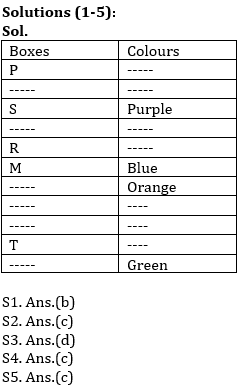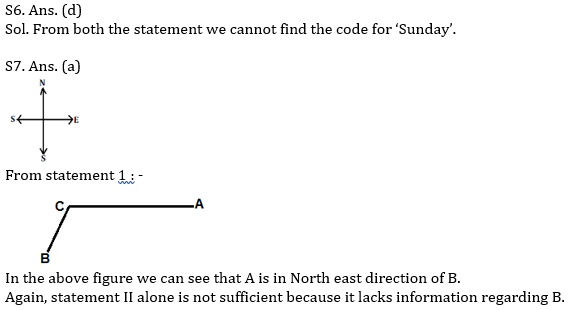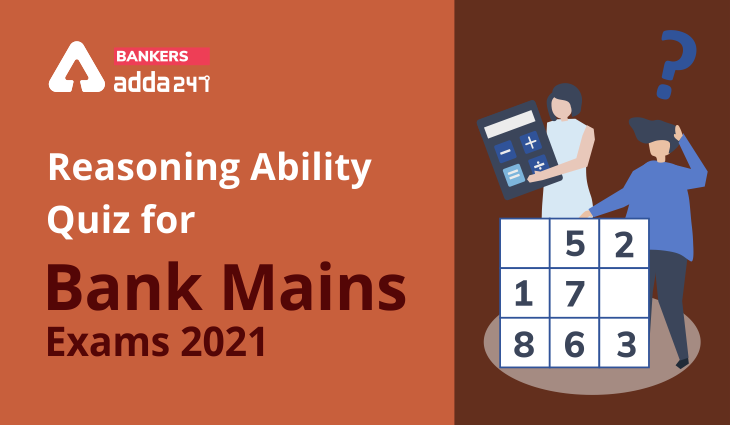Table of Contents
Directions (1-5): Read the following information carefully and answer the questions given below it:
Some boxes are arranged one above another. Box R is immediately above box M, which is of Blue color. Only two boxes are there in between Orange box and box T. Orange box is above box T. There is only one box in between box P and box S. Box S is of Purple color and is placed above box R. There are three boxes in between Orange box and Green box. Green box is placed below T. Only one box is placed in between box R and Orange box. More than four boxes are placed in between box P and Orange box. Not more than two boxes are placed in between box M and box S.
Q1. How many boxes are there in the arrangement?
(a)Ten
(b)Eleven
(c) Fourteen
(d) Twelve
(e) None of these
Q2. How many boxes are there between box R and box T?
(a)Five
(b)One
(c) Four
(d) Two
(e) None of these
Q3. Which box is immediately above Orange box?
(a) S
(b)R
(c) Purple box
(d)M
(e) Green box
Q4. Which box is placed at top and bottom respectively?
(a) T, S
(b)R, Purple box
(c) P, Green box
(d)T, M
(e) Blue box, R
Q5. How many boxes are there between Purple box and Green box?
(a)Ten
(b)Eight
(c) Seven
(d) Six
(e) None of these
Directions (6-10): Each of the questions below consists of a question and two statements numbered I and II given below it. You have to decide whether the data provided in the statements are sufficient to answer the question. Read both the statements and give answer.
(a) If the data in statement I alone are sufficient to answer the question, while the data in statement II alone are not sufficient to answer the question.
(b) If the data in statement II alone are sufficient to answer the question, while the data in statement I alone are not sufficient to answer the question.
(c) If the data either in statement I alone or in statement II alone are sufficient to answer the question.
(d) If the data in both statements I and II together are not sufficient to answer the question.
(e) If the data in both statements I and II together are necessary to answer the question.
Q6. How is ‘sunday’ written in a code language?
I. ‘January march sunday april monday tuesday’ is written as ‘dd ee jj oo tt yy’ in that code language.
II. ‘June monday july april march tuesday’ is written as ‘dd ee ll oo ww yy’ in that code language.
Q7. A is in which direction of B?
I. C is towards west of A and towards North-east of B.
II. C is towards south of D, which is towards North-east of A.
Q8. Amongst U, V and W, who scored the highest number of runs in the series XYZ?
I. Total score made by U and W was more than V’s Score.
II. Number of total centuries and fifties made by V were higher than U and W both, in the series.
Q9. A, B, C, D, E and F are sitting in a circle, facing towards the centre of the circle. Who is sitting on the immediate left of A?
I. A is facing D. Only C is between A and B. F is between E and A.
II. F is on the immediate left of E. Only D is between B and E. C is not adjacent to F.
Q10. Amongst A, E, I, O and U, which book is having the least price?
I. Price of the book U is less than those of I and O only.
II. Price of A is less than O and more than E.
Directions (11-12): Read the information carefully and answer the question given below:
There are six buildings in a colony i.e. P, Q, R, S, T, U. Building P is 8km north of building Q. Building R is exactly between P & Q. Building S is 6km east of building R and building T is exactly between R & S. Building U is 2km south of building S.
Q11. What is the shortest distance between building P and T?
(a) 3 km
(b) 4 km
(c) 5 km
(d) None-of-these
(e) 6 km
Q12. Building U is in which direction with respect to building Q?
(a) North-west
(b) North-east
(c) South
(d) None-of-these
(e) North
Directions (13-15): Two friends Silva and Jones started walking from two different points. Silva, who started from point A moved along a circular track and after walking 11km he reached point B, from where he turned left and walked 5km to reach point C after which he stopped. Jones started from point F towards west direction and after walking 5km, he reached point E. From point E he turned 45 degree towards his left and walked √8 km to reach point D. After reaching point D, he turned 45 degrees in clockwise direction. He then moved ahead 5km to reach point C which is towards the west of point D. Point B, C and D are in straight line.
Q13. In which direction was Silva facing at instant he travelled three-fourth of his total journey?
(a) East
(b) West
(c) North East
(d) South East
(e) Cannot be determined
Q14. If Silva keeps on walking ahead from point C and reached point G after walking 12 km, then what is the shortest distance between point F and G?
(a) 7km
(b) 4km
(c) 2km
(d) More than 7km
(e) None of these
Q15. In which direction did Silva start his journey?
(a) West
(b) East
(c) North East
(d) Cannot be determined
(e) None of these
Practice More Questions of Reasoning for Competitive Exams:
Solutions


S8. Ans. (d)
Sol. We are not getting proper information from both the statements.
S9. Ans. (b)
Sol. From 2nd statement we can see that C is on the immediate left of A.
S10. Ans. (e)
Sol. I/O > O/I > U > A > E
So, E has least cost.

Practice with Online Test Series for Bank Mains 2021:
Click Here to Register for Bank Exams 2020 Preparation Material




 GA Capsule for SBI Clerk Mains 2025, Dow...
GA Capsule for SBI Clerk Mains 2025, Dow...
 The Hindu Review October 2022: Download ...
The Hindu Review October 2022: Download ...
 Delhi CSIR CRRI Recruitment 2025 Notific...
Delhi CSIR CRRI Recruitment 2025 Notific...







